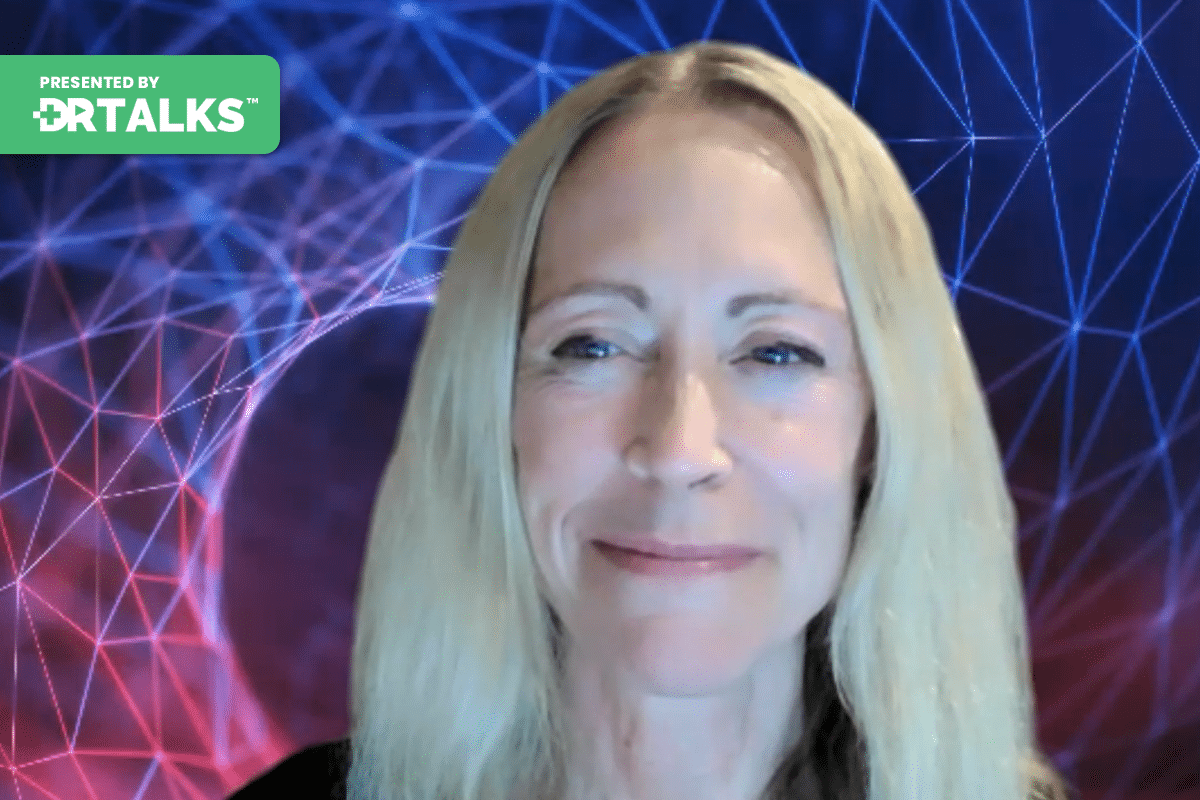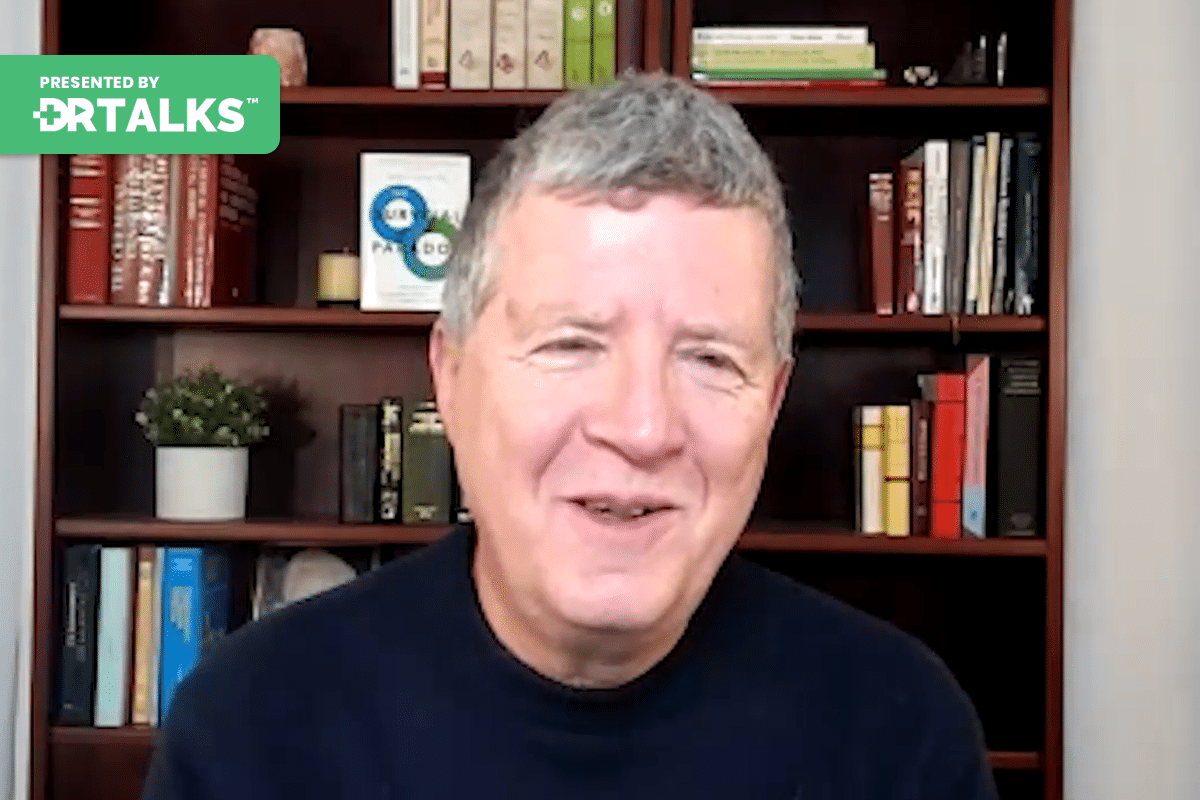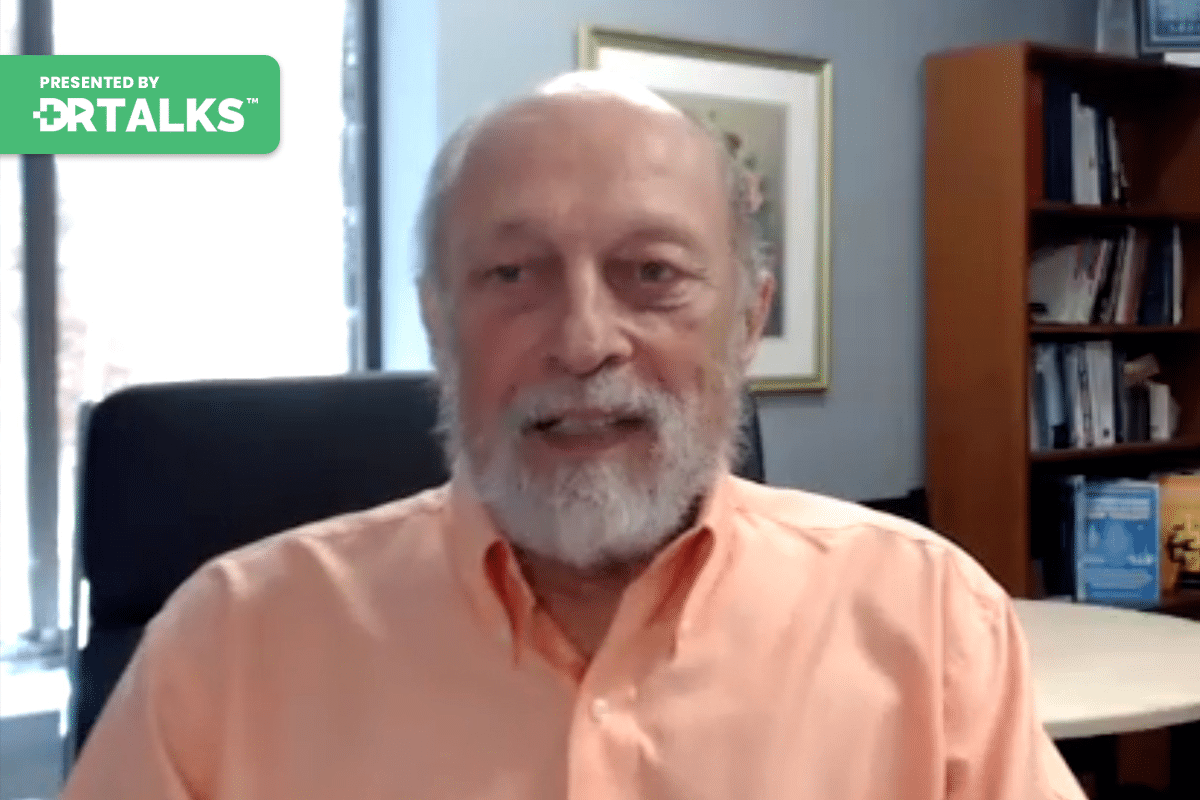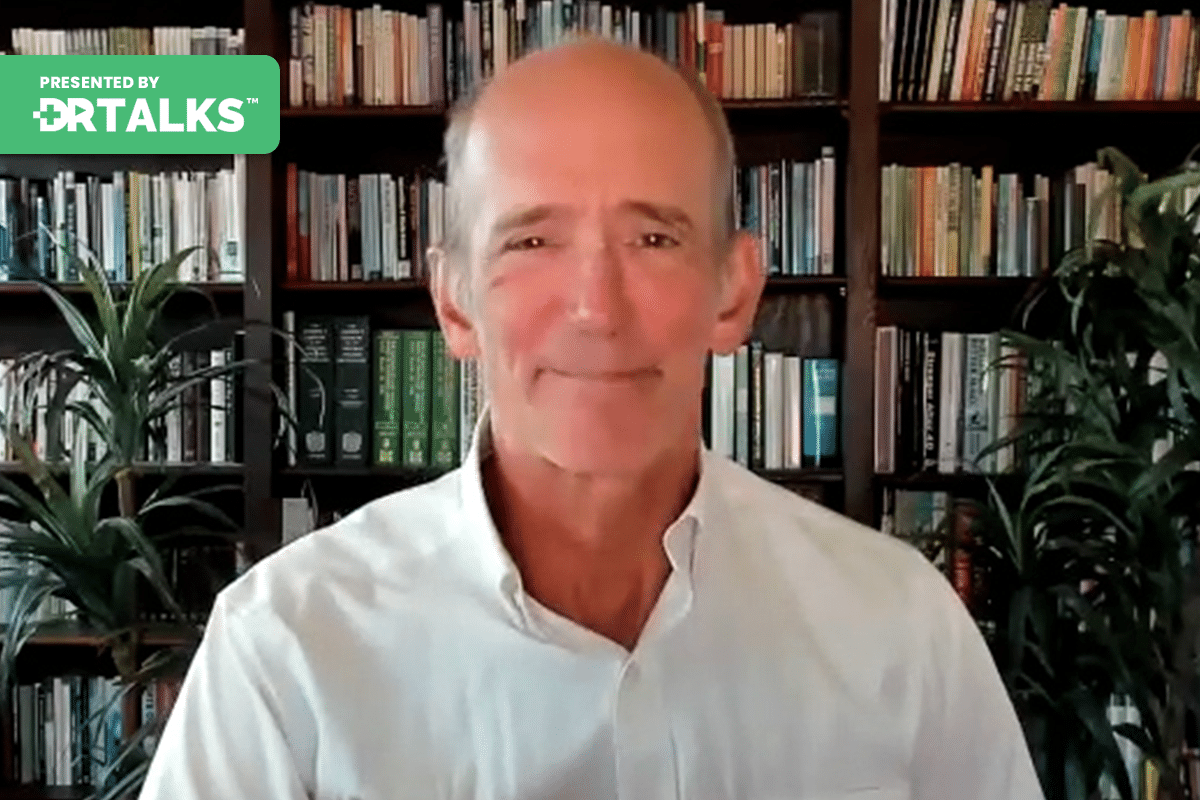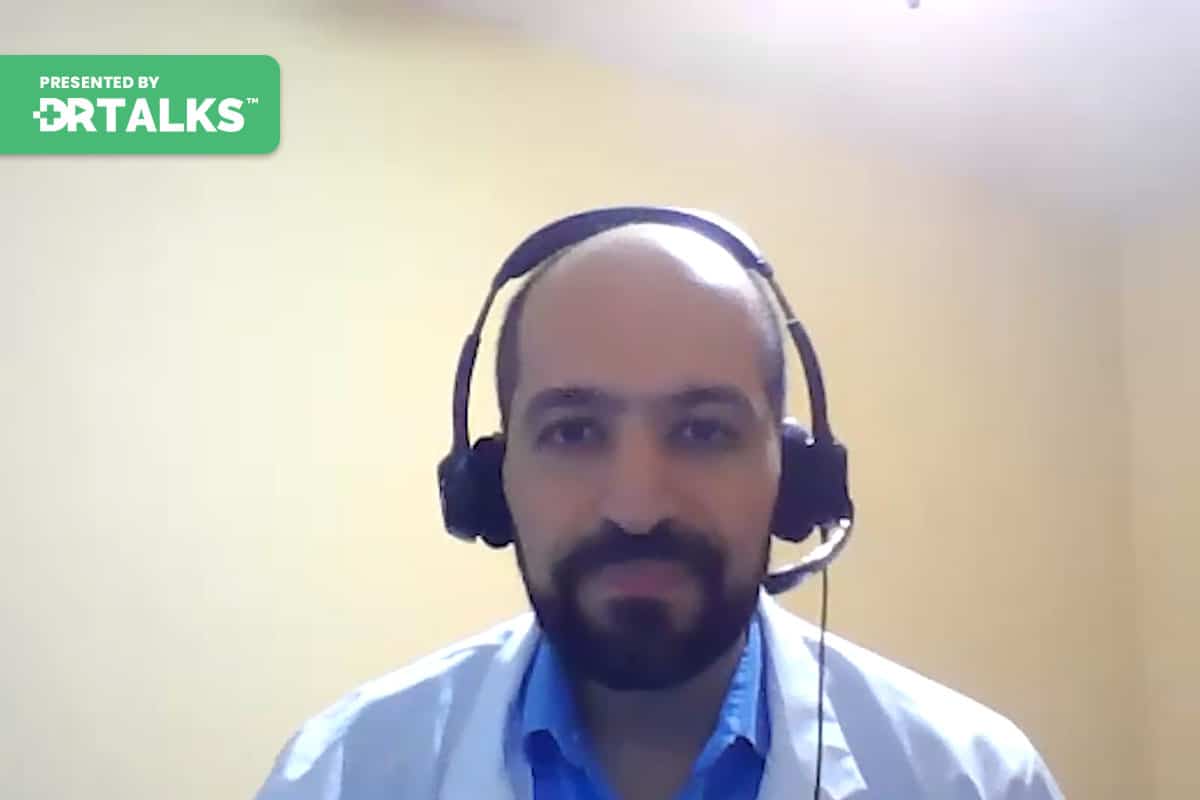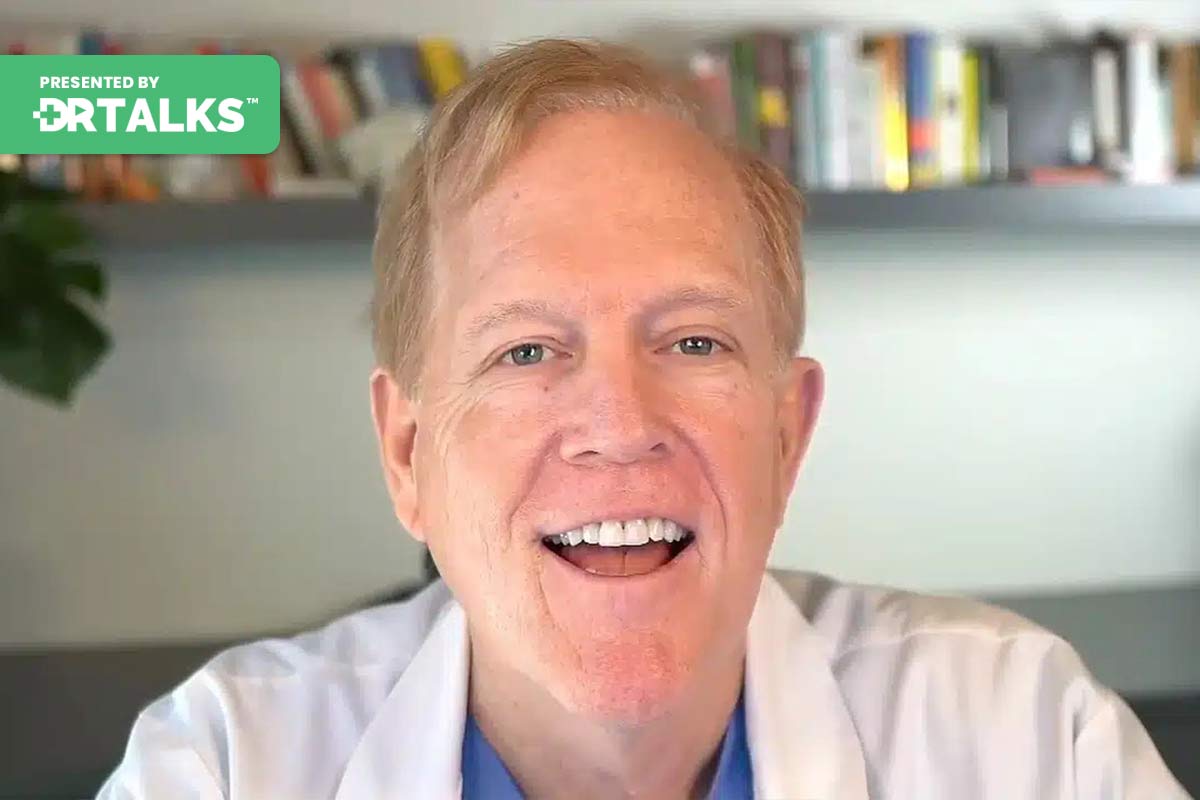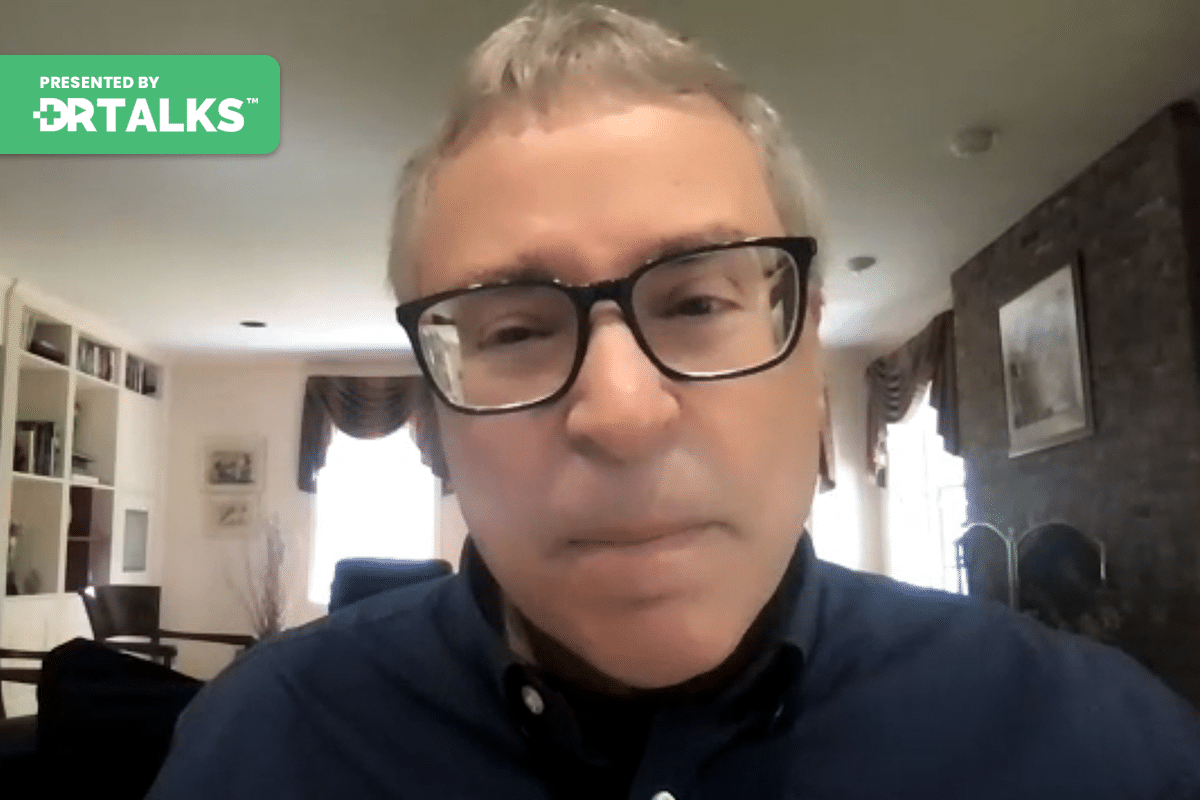Join the discussion below
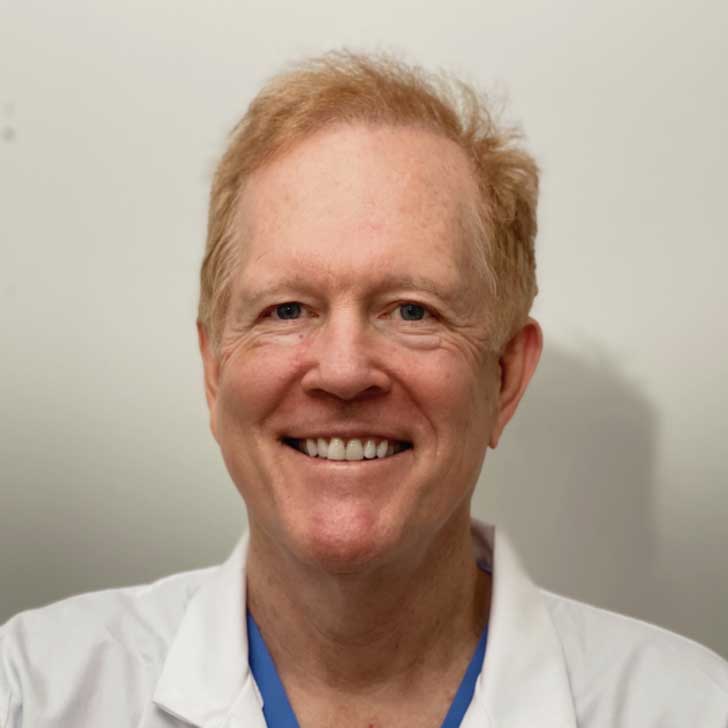
Robert is full Professor at a leading medical school and Chief of Neuroradiology at a large medical network in southern California. In addition to being a practicing physician, he is author of over 200 peer reviewed scientific papers, 32 book chapters and 13 books that are available in six languages. Read More
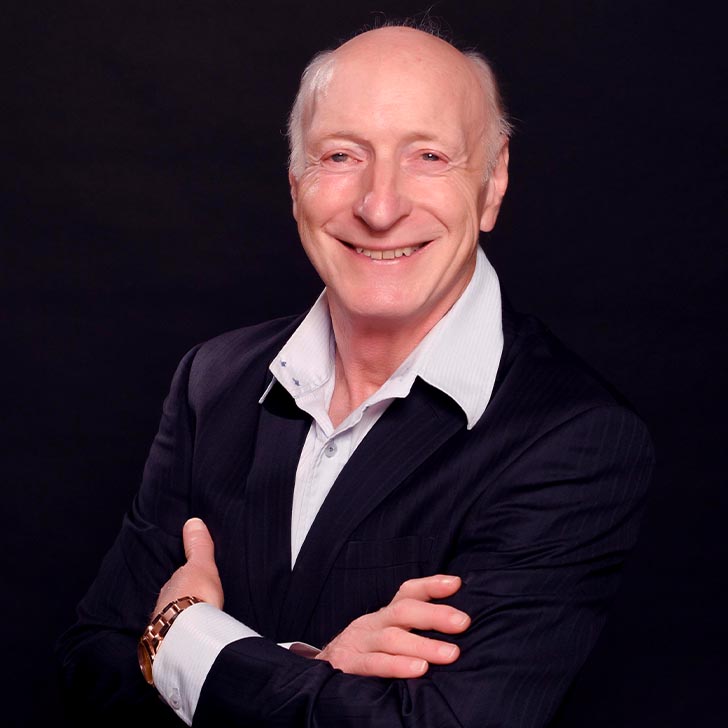
Dr. Stephen Sideroff is an internationally recognized psychologist, executive and medical consultant and expert in resilience, optimal performance, addiction, neurofeedback, leadership, and mental health. He has published pioneering research in these fields. He is a professor at UCLA in the Department of Psychiatry & Biobehavioral Sciences and the Department of... Read More
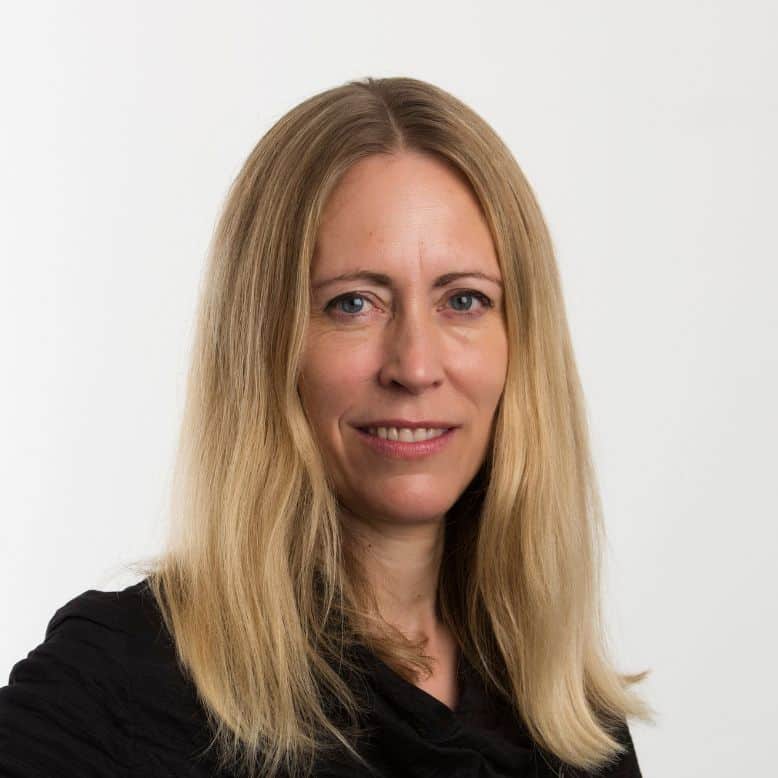
Tina Woods is a mission-driven social entrepreneur and system architect bringing diverse stakeholders together in shared endeavours to improve and level up health. She is Founder and CEO of Collider Health and works with private, public and third sectors, including UK Research and Innovation (UKRI)’s Healthy Ageing Industrial Strategy, NHS... Read More
- What is the UK National Innovation Centre for Ageing
- The blueprint for a ‘Healthy Longevity Innovation Mission’
- How creativity, emotional intelligence, compassion, & altruism affect longevity
Robert Lufkin, MD
Welcome to another episode of the reversing inflammaging, summit body and mind longevity medicine and I’m your host, Dr. Robert Lufkin. We’ll be joined today by my co host, Dr. Stephen Sideroff today, we get to explore an important side of longevity that’s often overlooked. Unlike the attention that’s paid to pills and potions and even lifestyle actions that can be adopted to fight aging. Less attention is paid to social and societal drivers of longevity. Our guest today is an expert on using public policy to influence longevity. Tina Woods is a social entrepreneur who has helped set an audacious goal of increasing the average lifespan by five years for an entire nation by 2035. Let’s find out how she plans to do this. Hi Tina, Hi Steve. Welcome to our program.
Tina Woods, MBA
Nice to be here.
Robert Lufkin, MD
Certainly great. Great to have you on the program and we’re so looking forward to hearing about everything you’ve done and getting into some some policy issues and social issues, but maybe before we do that you could take a moment Tina and just tell us a little bit about how you became came to be so interested in longevity and kind of where you are now in the process.
Tina Woods, MBA
Sure. Well, I mean it started way back when I was a young person, you know, I was always fascinated with biology and genetics. That’s what I studied at university. I was pre med and so I’ve always had a real interest in this whole arena, spent many, many years working in sort of farm and biotechs, I’ve always had an interest just generally in the science side of things and I suppose my interest in what I do now and of course, you know, I’m I’m getting increasingly involved in all sorts of different areas linked to essentially creating a longevity industry and paradigm which will enable us to live healthier for longer and happier. And so that has made me sort of delve into worlds that I’ve never sort of been involved with before, like policy and of course the investor community and, and of course, you know, public sector, you know, so I think about five years ago is when I really started to look at the longevity areas seriously, I started doing quite a lot of work in public sector after having spent most of my work in the sort of commercial sort of private sector, started getting very involved in ai and data, working with our public health care system called the NHS, looking at the impact of technology, I was always interested in how citizens and consumers were going to embrace the new technologies in terms of health.
And I became really interested in sort of, you know, the shift that we need to see really to move our sort of sick care model to a more preventative health model and I could see the opportunities and the potential of the live longer with ai of course I’m interested in living longer healthier and happier. But and the role of technology in that but of course a lot of it is about social social science, you know, public policy, there’s so many aspects that we need to really unravel and understand to really create a whole new way of thinking and doing health that is much more around prevention. So I’m sure I’ll touch upon all those areas as we go throughout questions. But yeah, so it’s really in the last five years and of course I’ve met all the pioneers and longevity medicine, the top top scientists and entrepreneurs investors, you know, all around the world. So and involved in some really interesting strategic projects and this is in the U. K. I live in London in the UK, but which have international and global sort of relevance and application, which I’ll come on to.
Robert Lufkin, MD
Yeah, you’re coming at this from a really unique perspective, both with your government positions as well as the private sector position, so I can’t wait to dive into that. But before we do, maybe we could just take a moment. It’s always valuable to find out from our experts. How do you conceptualize aging and longevity, What are the what is it what are the factors in your mind that contribute to it?
Tina Woods, MBA
So I think it’s interesting how you’ve even talked about aging and longevity. So there’s a whole big debate as you probably know about the whole language that we use and I think it’s gone through a lot of sort of quite an evolution actually because when I first started really getting serious about this whole field, you know, people would talk about longevity and they did immediately think about radical life extension and immortality and being able to live forever and all that sort of stuff in the, you know, Silicon Valley’s sort of, you know, billionaires all wanting to, you know, invest in in all these technologies and and therapeutics to help them live a very, very long life. And of course when you’ve got a good, that’s probably, you know, not a bad thing to do, I think. So I think, but actually as we’ve seen throughout the years and especially driven by the sheer impact, the colossal impact that we’ve all lived through from the pandemic, I think people are seen longevity and aging quite differently. And I think certainly in the westernized world and certainly the you can and indeed in the us aging is really tinged with a lot of negative sort of images and imagery because we’ve got ageism which is a really, really, I think the biggest barrier really that holds a lot of this field back. And so I think the language that we’re starting to use and there’s a lot that, you know, many of the scientific conferences that I’ve been speaking at just in the last, you know, two or three months even terms like anti aging they’re all starting to well actually is that really the Best term to use because we’re not saying that growing older is a bad thing, what we’re, what we’re really saying is that there’s many things that you can do to delay that the sort of the chronic diseases of aging.
So which is actually really where, you know, I think longevity, the whole field of longevity is really really starting to understand, you know, the biological basis, the hallmarks of aging. In fact, just last month they announced, you know, an additional five to the original nine that were first published in 2000 13, inflammation being one of those five. So as the as the field is becoming much more sort of savvy and really understanding, you know, the different hallmarks of aging and also the dependencies and the links between them, you know, it’s hugely complex, but it does mean that we can have and are starting to unravel really the biological basis of aging. So we’ve got terms like biological age, which certainly has started to enter the sort of consumer media for example. So there is starting to become a greater awareness of the fact that actually your biological age can be quite different than your chronological age. And actually there’s a there’s such an impetus and that we’ve now got some of the tools that will enable us to either delay our biological aging or indeed indeed, sort of, you know, sort of turn the clock back so to speak.
And that really I think is the interesting space because it starts to introduce in people’s mind. Actually aging is malleable. You don’t have to necessarily sort of start falling apart at the age of 50. You can really, you know, how you live your life. And of course with the growing availability of some of the really promising therapeutics, you know, we can really extend that period of healthy life health span. And I’m starting to use the terms healthy longevity quite a lot actually. So, so I think, you know, language is really important and I think there’s a lot of debate around it. I think we need to as a global community. I think we need to line on a shared language which speaks to the science and the potential. But also I think really takes on board that we’re not saying growing older is a bad thing. It’s about, you know, tackling the chronic disease of aging. That’s a good thing that we can do. So this is where using a language that doesn’t get dragged down by ageism, which is deeply cultural thing in many, many countries, which is going to take a long time to sort out, unfortunately.
Robert Lufkin, MD
Yeah. Yeah, absolutely. Ageism is one thing that it’s still somewhat socially acceptable. People would never say it in other situations. But somehow it’s okay to comment on someone’s age and their valley ability from that. But yeah, the paper you referenced on the hallmarks of aging when that came out and they added additional hallmarks of aging. I found myself asking, I wonder if that means we’re understanding it better or we’re understanding it less. We’re just adding more and more dials is getting more complicated.
Tina Woods, MBA
We’re understanding what it is, it’s knowing what we don’t know. It’s sort of like a complex and I think, you know, my fascination with all these technologies and you know, and ai and quantum computing and you know, it’s gonna open up this huge vista of opportunity. And just today, in fact, I think it was today they announced the breakthrough price for deep mines alpha fold, you know, where they literally, you know, through understanding protein folding, you know, using ai I mean that’s gonna unlock a huge, huge number of possibilities and understanding, you know, the aging process. So, you know, we’re on the cusp of you know, a massive explosion of understanding but it’s very complex. I mean we as human beings and as biological systems were very, very complex. And this is where we as humans are quite different. And this is I think the interesting bit around. And I know this is one of the questions I think that link between the biology and psychology of aging is I think an incredibly interesting area very, very ripe for further research and understanding.
Robert Lufkin, MD
Yeah, I think, yeah, we definitely want to get into that before we talk specifically about your work there back to aging and longevity, you’re right, there is a revolution, it’s moving faster and faster like it’s ever been. I wonder which areas are you most excited about, do you think are most promising in this, in this exploding space in so many different areas?
Tina Woods, MBA
It’s so difficult because there’s just so much so I’ve been recently fascinating. I mean I think the whole the whole gut microbiome thing is absolutely fascinating because you know, you know, even with the twin studies, you know, that’s been kings, you know, really showing that even if you’re identically if you’re you know genetically identical, your microbiome will have a huge impact on how you metabolize food for example. And there’s a lot of interest for example of how that might needs a new understanding of weight loss, but also indeed, you know, on the aging process. So that’s you know, a very sort of, you know, embryonic area that’s also right for explosion. But I would say one of the areas that I mean I’m fascinated by more recently, just because I’ve opened my eyes to the importance of the sort of psychological aspects of aging and even you know, there’s and there’s just so much, you know on brain sort of, you know, brain, you know, this concept of brain capital and sort of, you know, learning and and sense of purpose and optimism and how and reading about for example, I mean one of my sort of mentors really is is Alex Oberon cough you know who runs silicon medicine, was the founders in silicon medicine and deep longevity and of course he with Peter Diamandis has been doing a lot of work on psychological aging clocks and it just shows the huge importance of how we think and our mindsets even on the physiological parameters of aging and you know happiness and sense of optimism.
You know these are all you know hugely important concepts which are just the beginning of we’re just beginning to start to scratch the surface about how that will impact on how all these animal studies for example are going to play out in the in the in the in humans because we have to remember, I mean there’s been a huge huge you know interest and appetite is certainly in biotech and of course you know with you know sort of you know Metformin and wrapping my sin and the analytics and and so forth. But I mean let’s remember that there’s only they’re only just starting to enter into human, you know human studies and I just think you know that whole next stage of understanding will start to open up and also you know understanding you know how human beings think our sense of purpose, you know social connections, our sense of optimism, how that will also be really important factors. So I think this is why the ages and thing is so important to you know in those societies where people tend to live very very long lives yes part of it might be dying and yes of course it’s going to be linked to exercise. You see that in Japan and like areas like Sardinia in Italy for example they live in small communities, they do a lot of walking, it’s integrating their lives, eat mediterranean diets or for fish, fish based diets in japan.
But actually a lot of their longer lives I think are attributed to the fact that they live in sort of close communities, family families sort of centered sort of communities and they have and you know they are venerated for their age and you know it’s not a bad wisdom is a good thing you know. So I think these are really really interesting areas for further exploration and I think the scientists need to come together with the you know with with the social scientists and I think you know there’s gonna be a lot of you know really interesting discoveries opening up and and even for example you know you probably know that there’s been a lot of resurgence of interest and for example psychedelic medicine you know for for mental health you know for for depression O. C. D. Etcetera. But they’re also looking at it in the context of aging. In fact they’re even looking at it from an anti the anti inflammation and anti inflammation properties for example LSD and dementia. So I just think you know we’re on the cusp of giant sort of discoveries linking to the biology but also humans. The human bits our behavior because we are very complex animals the way that we behave and what motivates us as individuals are hugely influential in our whole aging trajectory.
Robert Lufkin, MD
Yeah it’s interesting you say that in creating this summit, Steve and I intentionally working together Steve is a clinical psychologist by training we intentionally our vision for this by calling it reversing inflammation summit. We added body and mind longevity medicine because we think just as you’re saying, one area that hasn’t received the amount of tension that’s due in longevity is the mental portion, the resilience, the stress, all those things that it’s so important. We hope to bring them out in this summit.
Tina Woods, MBA
So I think you pointed to something that is so important and I think uh is under recognized I think by, well it’s we get distracted because the science and the technology is so exciting and there’s so much investment going to this space. But I think so I’m really fascinated by a concept called the expose on which is essentially sort of the wider environment which in which humans live and thrive and its links to climate is linked to the planet etcetera. It’s about those environmental factors which allow a person to either thrive or not, and that of course is everything from what you eat, you know, your lifestyle, you know, pollution in the air stress, you know, so that’s mental health, you know, and how you how you behave and surviving, you mentioned resilience. Resilience is massively important. So, I think a lot of my work now is kind of like, it’s from like cells to cities, like making that link between what’s happening at a very very fundamental sort of unit of biology, you know, genetics, you know, cells, et cetera. And then linking that up into a much wider concept around the environment.
Because human beings are very, very influenced by the wide environment and that’s why the social determines with the wider determines of health, which actually are responsible for 80% of our health status. I mean, people don’t, a lot of people don’t realize that we can have so much focus on what’s happening in with our doctors and hospitals, which is only about 20%. So, so I think that whole 80% is becoming a huge policy focus certainly in the UK context and of course, coming out of Covid, I mean, the reason why we were so badly affected by Covid is that we’re in really poor health and and a lot of us linked to you to wider inequality, systemic inequalities, you know, poverty, depression, you know, loss of hope, despair, you know, Angus D. D. Deacon writes about that with you know, the opioid crisis. I mean, you know, those dragged down, you know, your years in good health and that’s a really really big problem. And I think we as a longevity community, you know, we have a responsibility to to understand that and and and and address that as well because it’s not just about the sexy glitzy, you know, molecules and drugs, it’s a much bigger thing than that.
Robert Lufkin, MD
Yeah, go ahead.
Dr. Stephen Sideroff
You make a very good point there and I really appreciate how you run the range from cell up to community in the world because every layer of that is really very important. One of the other distinctions between a lot of the medical and the psychological is that medical is something being done to you as the psychological is really about learning to heal your body and develop the notion of balance, physiological psychological balance which then affords you the best chance to take advantage of all the externals that are being developed.
Tina Woods, MBA
Absolutely, you know. And that sense of and I think a lot of it is about that sense of agency that you and with that you need the knowledge, but you also need the wider environment too. And I think that’s the difficult bit and that’s what this is where policy and government have a really important role to play is because you know not everyone has a good you know we are very unequal as a society and certainly in the US is the same as in the U. K. And you know there’s only so much agency you can have if you are in a really really poor you know if you suffer from lack of education and and you know you’ve got crime in your area you can’t send your kids to the playground because you’re worried about gangs you know these these these trapped people in a place where no matter what you say their sense of autonomy and agency is obviously going to be compromised. So I think this is where public policy and government have a huge role to play. And you know we kind of have to ask ourselves the question what kind of society do we want? Which is the big question.
Robert Lufkin, MD
Yeah I just want to underscore you according about the expos that’s really the main driver. All the environmental factors, all the lifestyle factors, the social the psychological factors and And you know we want to look to our grandparents for longevity and genetics but the numbers now it looks like it’s less than 10% of an effect. You know depending on which study you quote. So more and more we do have agency. It’s in our hands, what we want to do with it. In looking over your work, one of your famous quotes, I don’t know if you still stand by it was that you set an audacious goal of increasing the average lifespan by five years for an entire nation by 2035. I don’t know how that’s going in the US were actually shortening the average lifespan and it’s gone down.
Tina Woods, MBA
But we’ve had a blip with it. Of course. You know, listen, it’s it’s it’s a very very very ambitious goal and in fact, unfortunately, we’ve gone backwards and I think this is this is partly because of Covid, but I think Covid has taught us a huge lesson. I think it’s really shone the spotlight again, going back to the wider determines of health, you cannot set a goal like that until you really address the systemic reasons why people are in poor health. And it’s not just about individuals, it’s about, it’s about communities, populations. And I think so yes, the goal, it’s good to have stretched targets, so to speak. And I would say that that goal, so, so just so slight slight bit of I guess going back in the context for that goal is that in 2017, the UK set or they launched an industrial strategy and then they launched a grand challenge program in four areas and they set that goal to kind of be the target. You know, again using technology and investment going into the space, and especially in the aging society grand challenges where I was doing a lot of work is setting that goal for five extra years of healthy life expectancy while minimizing health inequality. So that was also that was also important part of it.
So set that goal and then of course, when the new we just had a change of government, you may know, but Boris Johnson, when he became Prime Minister, whatever it was four years ago, that was in the government manifesto commitment. Now it is still in the government manifesto commitment, but coming out of covid, of course, everyone realized my goodness, we’re going backwards. You know, obviously life expectancy has certainly gone down a bit just because of the covid and actually a funny sort of way, because we have so many people dying, it actually probably sort of had a positive fact, positive effect just for a brief moment in time on healthy life expectancy because we still have this terrible situation, We have a 20 year gap between poorest and richest people in terms of healthy life expectancy, the years lived in good health now that unfortunately now is in jeopardy of actually increasing further because you know, we’re still really tackling this whole naughty issue about the wider determines of health, how do we do that?
And of course now we have a new government who seems to be hellbent on a growth at all costs policy. So I think there are a lot of us feeling that we’re gonna go backwards a little bit on that. So, you know, but listen, we’ll just have to see, I think there’s a huge community that’s very very very focused on that goal still and what’s been wonderful about that goal because government supported it and endorsed it, I mean, we will see now what’s gonna happen with it. It meant that we could get all the key stakeholders aligned around kind of like a mission based approach. So you couldn’t really argue with it and actually I don’t think anyone could argue about that is a good thing. You know, the more people who are healthier for longer only helps everyone in society. So I think it’s non bipartisan, I think it’s something that a lot of people can get behind. But if you’ve got government committing to it, you’ve got investors, you know, significant government money going into it. And these are the sorts of things that I’ve been sharing with your colleagues in the U. S. Of course, you know, the Tallis Institute and the longevity alliance and you know, sort of because I think those goals do help if you’ve got government behind because then, you know, and and the mission based approach is very helpful to focus the minds and to break down the barriers in the silos and the metrics and the incentives to are the big big part of that puzzle.
Robert Lufkin, MD
I’d love to hear more about your role in the action you’re taking as the healthy longevity champion for the UK National Innovation Center for Aging.
Tina Woods, MBA
It’s a big, big, big, big, big, big title,
Robert Lufkin, MD
Yeah. What how are you using that role to uh, to move these goals forward and to accomplish change and longevity and health span?
Tina Woods, MBA
Yeah, so, so that’s a really exciting role to have. I mean, it’s sort of so, so as healthy longevity champion working with the lead organization in the UK looking at, well, they’re certainly looking at all the science technology behind healthy aging, healthy longevity, they’re very, very interested on the sort of brain capital side, the psychology of aging that link that we were talking about earlier. So they’re very focused on some very ambitious projects around things like long long long diversities which are sort of how do you create communities and neighborhoods and cities that promote, you know, health at, at, you know, across the lifespan. So it’s not just healthy aging, it’s not the later part of life because healthy aging tends to be compartmentalized to the plus fifties. Now, you and I know we have to start even before birth to really, you know, deal with, you know, you know, to really crack this. And so this the whole concept rests on creating environments. I mean, things like Active, you know, active transport, you know, green, you know, green spaces, you know, housing with smart technologies, but fundamentally it’s about involving the residents of citizens and local businesses in creating places that really promote good health and of course you need government to support that. You need investors to support it. So where So there’s a concept you probably very familiar is certainly in the climate, climate space around E. S. G. Investing and investing for clean energy investing, you know, disinvesting away from fossil fuels.
Well, there’s a big project, this is another hat that I work, which is a social venture called Business for Health. And so we’re and I’m working with, you know, pension funds, asset management, big companies really looking to invest in infrastructure projects like housing like, you know, neighborhoods cities etcetera to really bring health into E. S. G. So E. S H. G. And delivering, you know, commercial returns, of course that goes without saying, But fundamentally it’s about bringing social returns and societal returns. It’s kind of a big idea which kind of picks up concepts like inclusive capitalism, stakeholder capitalism, that the world Economic Forum have been talking about. So these are big things that we’re trying to launch in terms of longevity cities. We’ve got a big pilot called the Internet of carrying things, which is literally involving citizens in testing out all these new technologies, longevity as a service, you know, what are the products and services that we can be offering citizens, which is part of that concept longevity city.
So this is the big, big thing which links up psychology, behavior, brain capital, mental health, biology of aging. So we’re getting the whole community together. Policy investors science together to reimagine and come up with a mission, another mission and longevity, healthy longevity innovation mission which we are in the process of trying to excite. We’ve got a new fund that was announced by the government last week. It’s called the lifts fund which is an injection of investment in science and technology long term investment. We have a new group called area which is modeled around dark h you know, you know, sort of high risk innovation sort of investment. So we’re hoping to tap into that energy that investment a new way of thinking about health, which brings everything together to break down those silos and come up with some real breakthrough thinking, you know, leveraging ai technologies etcetera, Quantum you know etcetera etcetera. I can go on for ages for ages but it’s quite a big, big mission that we’re working up.
Dr. Stephen Sideroff
I just wanted to make a comment here because I think that’s what you’re talking about is brilliant in terms of how you’re bringing so many different facets together. I’ve written about resilient communities and talk about the, I’ve talked about the ingredients that go into having a community being resilient, which in my definitions translates into longevity and other things. So at some point we’ll have to talk about.
Tina Woods, MBA
So I really like that word resilience because resilience we’ve been taught we’ve been using that word quite a lot and some of the system changed mapping that we’re doing with this with because really fundamentally what we’re trying to do is move the sick care model to a more preventative health model. And resilience is a really interesting word because it’s long term sustainable. It’s it’s it’s seen its and and it’s it’s so and there’s a whole big international effort called reform for Resilience Commission. I don’t know if you’re aware of that but it’s a multinational effort and the U. K. Have been involved in that. And they are looking at creating linking health with economic growth and again it’s this new concept around resilience creating resilient, you know communities resilient growth, resilient health. So so yes absolutely would love to speak to you more about that.
Robert Lufkin, MD
Could you talk about the longevity cities? That sounds interesting like Steve’s resilience centers but what’s in the longevity city? What is that?
Tina Woods, MBA
Well I mean so it’s obviously early days because they’ve just literally launched but we’ve got templates that were sort of developing on the basis of real world pilot projects. So so so one of the uh so one of the pilot project that’s underway which has just received you know quite a significant amount of investment from the local council and government and investors in an area in a fairly deprived area. This is the north of England and what they’re doing is that they are creating an ecosystem of businesses and including obviously a lot of the new like startups and the new technologies, you know, you know, in fact, I think even I think Nicolina is on is one of your speakers, but you know, like an age, I think one of the businesses, but it spans like housing, it’s it’s it’s you know, it’s it’s a whole array of different sort of organizations coming together to kind of create almost like a test bed of companies technologies.
But the most important thing about it, which is absolutely fundamental is that they’re getting real people, the real people living in the community to participate and engage in these new technologies and and then through the data capture and through the understanding of how citizens are engaging, you know, whether it’s on the high street, like in retail centers or whatever their understanding how people are behaving in their normal environments and what will nudge them towards more healthy behaviors. So it kind picks up on some of the other kind of smart cities that we’ve been hearing about. Like for example, you know, the google funded project, sidewalk labs for example, I think it’s called, which actually had a huge public outcry because they were worried about tech sort of sort of sort of sort of abusing, you know abusing the data that they were capturing on citizens because I didn’t do a consultative process with the local community which is I think a big lesson that that was learn from that. But in this case and this is actually one of the other things that we’re looking at is how you create data frameworks data, government structures which will which in which citizen trust and how data is being captured and used to get those insights to understand human behavior is done with with citizen consent and actually is in the end used to drive up research which then goes back you know again that concept that I talked about earlier E. S. H. G. Is about you know delivering on the public good and understanding.
So I think there’s a massive and this is one of the big ideas around the longevity mission or healthy longevity innovation mission is capturing that data in big sort of we’ve got a concept called trusted research environment. So taking that concept where you have reservoirs of data where you know you have trusted researchers accessing that data to further research. And this is where biomarker research could benefit so hugely from those trusted sort of concepts trusted research environment concepts. There’s no the reason why you can’t actually do the same thing with commercial sort of private sector data. So these are some of the ideas that we’re exploring in the business for health sort of work that we’re doing, How do you access private sector data, public sector data for the benefit of citizens public good. That delivers commercial returns for organizations and investors, but you know, so it’s a whole new way of thinking about it and the ecosystem. So it’s really very exciting. It’s a whole new way of thinking about data technology involving citizens in this in a way that they will trust. And of course, you know, make money for companies, you know, we can’t forget bad either. So, but in a way that benefits everybody in a win win.
Robert Lufkin, MD
Yeah, I love that. You’re looking at public policy and affecting health along with the private sector, combining them to do things. I another one of your quotes came somewhere, was that one of the under utilized risk factors for longevity is simply the zip code where you happen to live if you could. Yeah. Yeah, absolutely. It underscores the social effects on longevity. But if you could, if you could wave a magic wand and change on a public health policy scale, if you could change one or two things, what you think would have the greatest impact on health and longevity for people right now.
Tina Woods, MBA
Well, I mean there’s the quick wins in the longer term sort of gains. I do think we just need to, everyone needs to wake up that to be able to really tackle the very really big challenge that we’ve got. I mean our current health care system and I’m, you know, I’m sure the U. S. Are in a similar path as us. It is so unsustainable at the moment, particularly with the covid, you know, post covid, we’ve got gigantic backlogs where we are spending more and more of our taxpayers money, sort of effectively subsidizing a system that is not fit for purpose. It cannot cope. It is unsustainable as much as we love it, which we all do. We have to understand there has to be a long term system led approach to solving this. There has to be an understanding of the importance of prevention. How do we do that? So this is where I think the business community is so exciting because I think the business community and the investor community taking a leaf from climate are recognizing that there is a significant comm commercial opportunity by getting this right patient capital, wait, you know, waiting for the long term, it’s not going to be a quick win, but, you know, it has to be done in a very, very different way because the problem that we have at the moment, everything is short term political cycles.
You know, the NHS budget cycles or healthcare system, we have to take a long term view. And I think this is where the business world could be really, really important to be a significant positive disrupter. So this is why I think, but I think, but ultimately I do think it is up to all of us to understand that we can do something about our health, it is not something that we just need to leave to be fixed by a doctor, so I do think greater awareness, anything from a behavioral change perspective that can change our behavior is only going to be a good thing, so this is where, you know, sort of, you know, all the new technologies, which all the, you know, the big tech companies know they know us, how well we behave as human beings, we’ve got to really understand, you know, how we can encourage all of us to do more to, you know, do our bit to, you know, in proactive prevention combined with the investor business community, combined with government support, so it’s just, you know, we just have to think differently, sick care is not working, prevention is always better than cure, we’ve got to spend more on the cure prevention bit, and so what do we do about that awareness in schools, for example, you know, we’ve got to teach your kids how to cook healthy meals, you know? It starts right from day from day 0 so yeah,
Robert Lufkin, MD
Well, so on the prevention side that certainly it’s a great message. If you had to, if you had to narrow it down, do you think the most bang from your buck and prevention is going to come from like nutrition, exercise, meditation, stress resilience, which of those areas do you think? Or all of the above, of course,
Tina Woods, MBA
But it’s all the above and of course we all are very unique in the makeup that’s gonna work. The formula will work for us as individuals. And I think that’s that’s a life quest, you know, what works, but but this is where, you know, technology and all things that can help you understand, you know, where you’re at on that sort of trajectory is very, very helpful. What are the things that you can do? But let’s remember that, you know, no pill, what, you know, whatever comes through in the next sort of few years can undo the effects of bad lifestyle, poverty, stress, you know, X right, because that would take 10 years off your life right away. We also know that the placebo effect adds two years automatically. This is what Brian Kennedy says about all the studies that he’s doing in Singapore. Hope is really important to optimism. So these are really, really important. So, I think, you know, an understanding that is key to that. So, I think, you know, we know, so we know research, you know, this is published research, we know that if everyone walked 20 minutes today, that would have a colossal impact on our healthy life expectancy and would have a significant economic benefit globally as well, rand research modeling on that, I think it was a calculated 100 billion, you know $100 billion will be added to the economy just simply walk 20 minutes a day. I mean these are simple things, you know, but yet we don’t do them because we are human beings were very complicated. We have all kinds of reasons why we don’t do these things. So this is why understanding human behavior is so important. So I think nutrition is really important.
So one of the big areas that we’re looking at with business for health is food systems and shaping the food system. We know, and I’m afraid that the U. S. Are also victim to this. We know that we eat far too much ultra high processed food. And there’s a gigantic, you know lobby, there’s a lot of scientific research, you know, trying to prop up marketing claims by you know, manufacturers claiming their marketing healthy foods. But actually we know that those those foods are not helping our health, they’re damaging our health. So this is where the S. H. G. Argument can be really, really powerful. Disinvest away from from companies that are, you know, turning out the junk food and marketing it to our kids so that, you know, you know, again, libertarians may not agree with this, but actually when you look at it with the evidence, it’s a significant factor in childhood. It is the biggest thing that the U. K. Are dealing with at the moment, the obesity crisis. It is and I know the U. S. Are the same and indeed we’ve seen it happening in countries in Africa and Nigeria. It’s happening all over the world and I’m afraid that’s a really big area that needs attention. Absolutely.
Robert Lufkin, MD
Yeah. And it’s not just a matter of education like you. You can explain to people how harmful given processed food is, let’s say and everybody gets it, everybody understands it. But there are the psychological overlays of addiction where they physically can’t stop eating it. And sugar addiction is a known thing and other other types of processed food. I think you know famously when the tobacco companies took over the processed food business, they basically learned from their mistakes and they used the addiction business model to sell colored cereals to Children and you know all the things that they sell now. So the psychological component is going to be necessary. It’s not enough just to educate people. It’s it’s such a such a complex thing,
Tina Woods, MBA
Very complex, very nuanced. You know unconscious processes of behavior, you know, it’s about wide environmental context. And the problem is this food is cheap, junk food is cheap and that’s you know, so if you’re really really struck if you’re living in poverty and you need to feed your kids, what are you going to do? That’s the problem.
Robert Lufkin, MD
That’s true. That’s true.
Dr. Stephen Sideroff
That’s why the work that you’re doing on a community level on a governmental level is so important because some of these things have to start on that level.
Robert Lufkin, MD
And I have to say in the United States at least I can’t speak for U. K. But one reason junk food is so cheap is that there are incredible subsidies for corn and soybeans so that these grains these junk food type products, don’t have the cost of market value. And then the other side of the coin is to uh is as much money you save by eating poor foods. It ultimately may not make up for the cost of the chronic disease. Even in a system where health care is free, there’s still a personal cost for being sick and you know all these all these other things. But so many things to go over here, we’ve talked about public health side and then and then private investors into public health projects. What about just the private investors in venture capital now? Is are they in longevity space? Are they just interested in drugs now? Is that the main thing or what where do you see that space going?
Tina Woods, MBA
I mean, you know, Yes, of course, I mean the drugs but you know, it depends on how you sort of see the longevity industry because you know, it’s it’s quite broad actually. I mean yes, there the hard course of therapeutics and you know the analytics and the you know the molecules bit and of course biotech investing heavily in that bit and then I mentioned you know the new kind of things that are coming on stream like the psychedelics that are looking at it and you know, so there’s there’s there’s a huge uh focus on that, but then there’s all also like age tech, you know the technologies for assisted living, you know, there’s that and then of course there’s what I call and of course you know financial resilience and well being there all these products and services to help you plan for a longer life, you know, so it kind of and and of course you know getting that right sort of financial resilience, your health resilience, you know psychological resilience, you know, I sort of see them they’re all on a spectrum because they are going back to the wider determines of health discussion, you know, these are all really important in terms of you know, increasing your healthy life expectancy, your trajectory and what you can you know what you can influence to kind of give you a happier, healthier longer life.
You need to have your finance, you need enough money to live on, you need the hope you need things that you need to learning, you know education, even education, you know you know for for older people to keep engaged, you know, things that they love, you know learning, I mean I can’t imagine the day that I stop learning is the day that I’ll die. You know, feeding your passions your interests, so I think it really on your definition of longevity and I think that again is another opportunity to kind of, you know, with with a whole range of sort of, you know, life products, you know, I call them life to help you manage your life, which is yes, the biology, the finances, you know everything because actually the data, you know, on your life, you know, is there around you. And this is the really exciting thing. And this is what we can talk a lot about, you know, the longevity cities concepts because, you know, we’re all and of course big Tech knows is that the data exhaust, you know, that we generate on what we do in our lives? You know, it gives us a huge understanding which of course, you know, tech uses all the time to understand our preferences are our choices and offering us things well, let’s make sure we can use all that to nudge us towards healthier choices. That will help us have a healthier longer life.
Robert Lufkin, MD
Well, in your experience, what’s wrong with the system if you’re in a country that a large part of health care is paid for by the public sector. And there’s evidence showing that certain behavior leads to certain diseases? Why are you not able to be more effective in changing that behavior? Is the evidence not strong enough? Is it too controversial what kind of pushback are you getting? I mean, why isn’t this a slam dunk? I mean, you know, we’re a C G M don’t do this and, you know, do you know, I think, I think certainly in the UK context,
Tina Woods, MBA
I think we’re addicted to our health care system. I think literally we assume that they’re going to solve all of our problems and that is the problem. And I think that’s actually one of the drawbacks of having, you know, a publicly funded health care system. We become dependent on it because we think, oh, well, it’s there to fix us when things go wrong and we fund it through our taxpayers money. So it takes so I think the cultural bit around how we think about health is the most difficult thing to dismantle. And of course it’s very politicized because the politicians, they’re too scared of saying, listen, this system is not working because they will get such, but because we’re so wedded to it, we’re so addicted to it. We’re so in love with it that, you know, so it’s dangerous to even like, tinker with it. So this is the real dilemma that we face.
But I think we’ve reached a point now where I’m afraid, you know, we have got such a problem on our hands. I think we’re gonna need to come up with something quite bold and radical pretty soon. So, I’m looking for. So I’m working with the stakeholders and hopefully we’ll come up with some approaches that will help, you know, change this, this, this mindset. And I think it will come from the general public, they’ll realize because already they’re seeing they’re not getting, you know, there are waiting lists forever, you know, we’re seeing people having to turn to private health, you know, just to get the care that they need. So it’s by stealth, it’s already happening through sheer necessity. So I think some big changes are in store, I’m sure just because it’s just so unsustainable at the moment.
Dr. Stephen Sideroff
But this is this is I agree, and this is also the reason why understanding the psychological nature of all of us is so important. And I began doing workshops in stress. I thought that was a slam dunk. Everybody wants to manage their stress until into it. And really discovered all of the resistance that people have partly because of their emotional wounding and partly because of the lessons they learned in childhood. These things create conflicts in individuals that actually get in the way of people doing what would be in their own best interests. So it’s again, another.
Tina Woods, MBA
Yeah, absolutely, absolutely. I couldn’t agree with you more.
Robert Lufkin, MD
Yeah, that’s a great point Steve well, thanks so much for taking time to speak with this today Tina. How can people by the way, I have to say, I love your book Live longer with a I love Ai and all that’s going. But it’s specifically looked at how artificial intelligence is helping us extend our health spans and live better too. It’s a great book. I want to recommend it to everybody out there.
Tina Woods, MBA
Thank you.
Robert Lufkin, MD
How can people get in touch with you or get a hold of you follow you on social media. Some people may be listening to this as an audio version. You could just tell them your website will have it in the show notes as well.
Tina Woods, MBA
Absolutely. Well, I’m on linkedin Tina Woods, you know, LinkedIn and I think it’s Tina Marie Woods. But yeah, you’ll find me. And then I’m on twitter at Tina Woods on, on twitter, you can google my book, it’s on amazon. And my website is Colliderhealth.com. So collider like colliding forces. So colliderhealth.com. And you can reach me there as well.
Robert Lufkin, MD
Great, thanks, thanks so much Tina and thanks Steve for joining us here. And we’re looking forward to great things in the future from you in in the UK there and
Tina Woods, MBA
Thank you, Thank you so much. And it’s been such a privilege and honor to participate in your program, which is wonderful. And so, looking forward to listening to all your other experts and pioneers. They’re all incredible, you know, incredible people. So thank you for involving me.
Robert Lufkin, MD
Great. Thanks here. We’ll do that. Hey, we just had a great conversation with Tina Woods. She’s a social entrepreneur who has helped set an audacious goal of increasing the average lifespan for an entire nation by five years. And Tina, it was great having you on the program.
Tina Woods, MBA
It has been such an honor and so much fun speaking with you and swapping notes between what we’re trying to do in the U. K. And and obviously, you know, all the wonderful developments that are taking place in the longevity community in the U. S. And worldwide. And so we need to swap notes, collaborate and work together to deliver, you know, the promise of a healthier, happier life for as many people as possible.
Robert Lufkin, MD
It was a great session and we really enjoyed it. Thanks again. Tina.
Downloads

